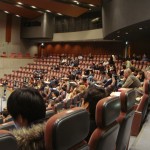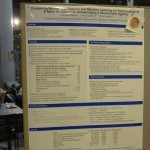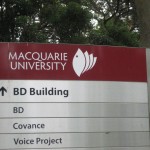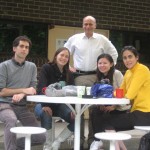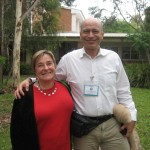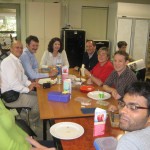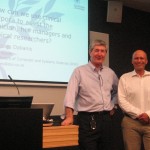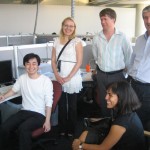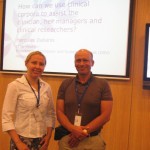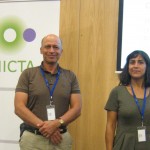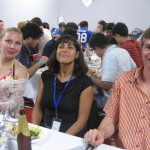Professor Henrik Boström and associate professor Lars Asker from System Analysis and associate professor Hercules Dalianis from IT for Health submitted a research proposal with the title High-Performance Data Mining for Drug Effect Detection to SSF (Strategiska stiftelsen) encompassing 19 MSEK and 5 years. University of Borås is co-applicant. Stakeholders are Astra Zeneca, Karolinska University Hospital and Karolinska Institutet, TakeCare – Compugroup Medical as well as Hjärt- och Lungsjukas Riksförbund. The aim of the project is to detect adverse drug reactions based on models and data repositories within the pharmaceutical industry but also on “real” data such as electronic patient records and registries of prescribed drugs, and in the form of globally collected individual case safety reports. The detection will be carried using various data and text mining methods implemented in a parallel computing system for fast and efficient processing. The outcome of the project will be faster drug development, less adverse drug reactions and better treatment of patients.
Research proposal KOL-text submitted to Vetenskapsrådet
A research proposal with the title: KOL-Text – Survey of prevelance of comorbidity, gender differences and treatment of Chronic Obstructive Pulmonary Disease (COPD) using a large electronic patient record database, was submitted to Vetenskapsrådet in the area of Medicine. The proposal was jointly written with the Institute of Environmental Medicine (IMM) at Karolinska Institutet. The project proposal encompasses three years and 6.4 MSEK.
Funding accepted for exchange of researchers with University of California, San Diego
Sumithra Velupillai, fil.lic, obtained funding from Stockholm University for cooperation with the research group of associate professor Wendy Chapman at University of California, San Diego, (UCSD), USA.
The funding will be used for exchange of researchers between IT for Health, DSV and the UCSD School of Medicine’s Division of Biomedical Informatics, San Diego, USA. The research area is Health Informatics and specifically clinical text mining.
The research cooperation will start in May 2011 and carry on until December 2013.
Congratulations Sumithra!
IMAIL paper at CICLing 2011, Tokyo, February 21
Our paper from the IMAIL-project with the title Comparing Manual Text Patterns and Machine Learning for Classification of E-Mails for Automatic Answering by a Government Agency by H. Dalianis, J. Sjöbergh and E. Sneiders, were presented at CICLing 2011, 12th International Conference on Intelligent Text Processing and Computational Linguistics, February 20-26, Tokyo, Japan, by Jonas Sjöbergh who participates in the IMAIL project from KTH. The proceedings were printed in Springer Verlag.
The paper shows that a manual approach to create rules for answering e-mails (in Swedish) is more accurate than using a machine learning approach, though a machine learning approach gives higher recall.
CICLing had around 100 participants below a couple of photos.
Open IS-seminar: Lazar Rusu and Edephonce Nfuka
First seminar in the Open IS-seminar series. Every first Wednesday in each month.
February 2, 2011 from 12-13.00 in sal 6405A, BYO (bring your own) sandwich or lunch.
Welcome!
Title: The effect of Critical Success Factors on IT governance performance
in public sector organizations in a developing country
Key word: IT Governance
By: Lazar Rusu and Edephonce Nfuka
Abstract
Today in many public sector organizations, the use of IT has become ubiquitous in every facet of the organizations’ endeavours in supporting and evolving public services delivery. This ubiquitous use of technology have caused a critical dependency on IT, which in this environment involves a complex mix of political, organizational, technical and cultural concerns that call a specific focus on effective IT governance. Accordingly, the success factors for governance over these organizations IT resources must be entrenched and adhered to if they have to increase contribution of IT in achieving their objectives. Several researches have been done on such IT governance and necessary success factors in these organizations. Yet with no focus to such organizations in a developing country like Tanzania, which on one hand is characterized by IT resources, knowledge, and culture constraints and on other hand by the increase of IT investments and applications.
However, recently, based on IT governance focus areas and five organizations from this environment, an exploratory study to address such a gap has been pursued specifically on identifying Critical Success factors (CSFs) for effective IT governance. Although based on such a study it is reasonable to believe that these CSFs have effect to IT governance performance, this has not been confirmed. In this paper we have specifically addressed such a gap by hypothesizing that such correlated effect exists and we deductively examined it.
This was achieved based on a developed research model, survey research method, sample data from Tanzanian public sector organizations and a second generation structural equation modelling technique namely partial least squares (PLS). The result indicated significant moderate to high positive effects to IT governance. The CSF with most significant effect was “Involve and get support of senior management” and the least “Consolidate, standardize and manage IT infrastructure and application to optimize costs and information flow across the organization”. Finally a CSFs model for effective IT governance in this environment was also suggested. The findings provide more focus on CSFs that have a higher impact on IT governance performance in public sector organizations in a developing country and can improve available approaches.
Research visit in Australia, November 29- December 10, 2010
Bachelor students present their thesis at SLTC 2010 at Linköping University
Aldin Draghoender and Mattias Kanhov, both students at DSV, presented their bachelor thesis with the title Creating a reusable English – Afrikaans parallel corpora for bilingual dictionary construction, at SLTC 2010 at Linköping University October 29, 30. SLTC is Swedish Language Technology Conference that took part for the third time. Aldin and Mattias presented their work that in form of a poster. They obtained many question from the interested audience both on how they plan to improve their work and about their method on evaluation.
Arriving to SLTC at Linköping University
One minute poster puffing
Waiting for audience
Plenty of interested audience
The Master Programme in Health Informatics with Karolinska Institute has started
Now the Master Programme in Health Informatics with Karolinska Institute has started.
